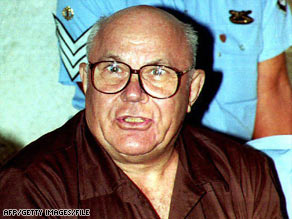
Nazi war crimes suspect John Demjanjuk was taken into custody by U.S. Immigration and Customs Enforcement agents Tuesday for an expected deportation to Germany.
They picked him up at his home in Cleveland, Ohio. German authorities have accused Demjanjuk, 89, of involvement in killings at Sobibor, a Nazi death camp in Poland, during World War II. He has denied the allegations. His deportation would close a chapter in one of the longest-running pursuits of an alleged Holocaust perpetrator. It also would set the stage for what likely would prove to be an extraordinary German war crimes trial. On Friday, a federal immigration board rejected an emergency appeal for a stay of Demjanjuk’s deportation. His attorney, John Broadley, had argued that deporting his client would constitute torture because of his health problems. The lawyer told CNN in a recent interview that Demjanjuk suffers from pre-leukemia, kidney problems, spinal problems and “a couple of types of gout.” Broadley has filed a new expedited appeal for an emergency stay to the 6th U.S. Circuit Court of Appeals, but Justice Department officials said they believe his chances of getting the board’s ruling overturned are slim.
Don’t Miss
Nazi suspect’s deportation appeal rejected
Judge stays deportation of accused Nazi guard
“Looking at what’s going on in Cleveland … is truly appalling,” Broadley said in a statement shortly after Demjanjuk was taken into custody. “You have an 89-year-old man with various physical ailments, and you have eight guys from [Immigrations and Customs Enforcement] trying to stuff him into a wheelchair to send him to Germany. This looks like something taking place in Germany and not in the United States.” Rabbi Marvin Hier of the Simon Wiesenthal Center found irony in Broadley’s argument for his client. “He wants to plead the sense of fairness that he regularly denied all of the victims at Sobibor,” Hier said. He called Demjanjuk’s comparison of his planned deportation to torture “preposterous coming from a person that served the [Nazi organization] SS in a death camp. It is a preposterous argument and insulting to the survivors of the Holocaust.” Hier said 250,000 Jews were killed at the camp, and none of the guards who worked there was blameless. “You were there for one job: kill the Jews,” he said. “And that’s what they did full time.” He called the evidence against Demjanjuk “overwhelming. German authorities issued an arrest warrant for Demjanjuk on March 10, accusing him of being an accessory to 29,000 counts of murder as a guard at Sobibor from March to September 1943. The warrant was issued after the authorities concluded an identification card provided by the U.S. Office of Special Investigations was genuine. Demjanjuk, a retired autoworker living in Cleveland, has been fighting charges of Nazi war crimes for more than two decades. He previously was extradited from the United States to Israel, where he was convicted in 1986 of being “Ivan the Terrible,” a guard at the notorious Treblinka extermination camp. The Israeli courts overturned his conviction on appeal, and he returned to the United States. The United States filed new charges against him in 1999, again alleging he had been a concentration camp guard. He was stripped of U.S. citizenship and has been awaiting deportation since 2005 after fighting his case all the way to the Supreme Court. Demjanjuk, a Ukrainian, has said he saw action in the Soviet army and later was a prisoner of war held by the Germans.